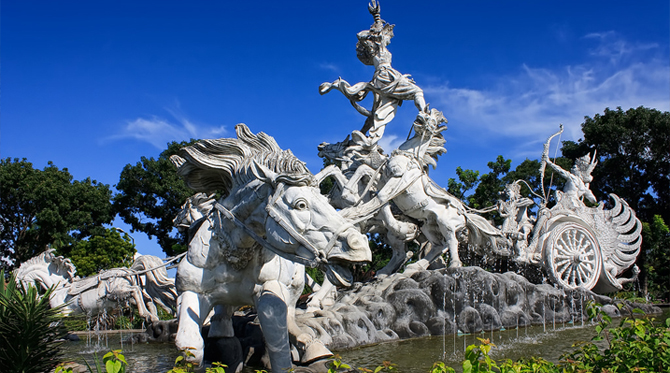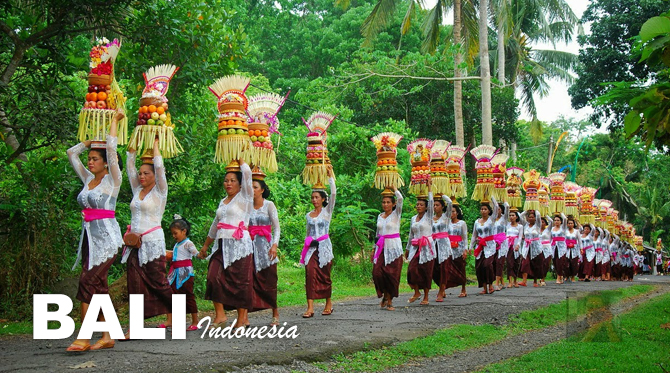BALI RELIGION
Unlike most of Muslim-majority Indonesia, about 83.5% of Bali's population adheres to Balinese Hinduism, formed as a combination of existing local beliefs and Hindu influences from mainland Southeast Asia and South Asia.
Minority religions include Islam (13.37%), Christianity (2.47%), and Buddhism (0.5%).
The general beliefs and practices of Agama Hindu Dharma are a mixture of ancient traditions and contemporary pressures placed by Indonesian laws that permit only monotheist belief under the national ideology of Panca Sila.

Traditionally, Hinduism in Indonesia had a pantheon of deities and that tradition of belief continues in practice; further, Hinduism in Indonesia granted freedom and flexibility to Hindus as to when, how and where to pray.
However, officially, Indonesian government considers and advertises Indonesian Hinduism as a monotheistic religion with certain officially recognised beliefs that comply with its national ideology.
Indonesian school text books describe Hinduism as having one supreme being, Hindus offering three daily mandatory prayers, and Hinduism as having certain common beliefs that in part parallel those of Islam.
Scholars contest whether these Indonesian government recognised and assigned beliefs reflect the traditional beliefs and practices of Hindus in Indonesia before Indonesia gained independence from Dutch colonial rule.
Balinese Hinduism has roots in Indian Hinduism and Buddhism, that arrived through Java. Hindu influences reached the Indonesian Archipelago as early as the first century.
Historical evidence is unclear about the diffusion process of cultural and spiritual ideas from India. Java legends refer to Saka-era, traced to 78 AD.

Stories from the Mahabharata Epic have been traced in Indonesian islands to the 1st century; however, the versions mirror those found in southeast Indian peninsular region (now Tamil Nadu and southern Karnataka Andhra Pradesh).
The Bali tradition adopted the pre-existing animistic traditions of the indigenous people. This influence strengthened the belief that the gods and goddesses are present in all things.
Every element of nature, therefore, possesses its own power, which reflects the power of the gods. A rock, tree, dagger, or woven cloth is a potential home for spirits whose energy can be directed for good or evil.
Balinese Hinduism is deeply interwoven with art and ritual. Ritualising states of self-control are a notable feature of religious expression among the people, who for this reason have become famous for their graceful and decorous behaviour.

Apart from the majority of Balinese Hindus, there also exist Chinese immigrants whose traditions have melded with that of the locals.
As a result, these Sino-Balinese not only embrace their original religion, which is a mixture of Buddhism, Christianity, Taoism and Confucianism, but also find a way to harmonise it with the local traditions.
Hence, it is not uncommon to find local Sino-Balinese during the local temple's odalan. Moreover, Balinese Hindu priests are invited to perform rites alongside a Chinese priest in the event of the death of a Sino-Balinese.
Nevertheless, the Sino-Balinese claim to embrace Buddhism for administrative purposes, such as their Identity Cards.
